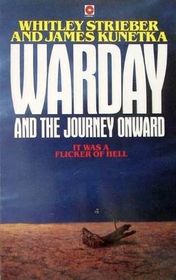Helpful Score: 2
Oldies, do you remember \"You are There\" the television series? This is like that. This is a journey across America after a \"limited\" nuclear war. It is so very real that it is scary.
Helpful Score: 2
Except for the Towers still being in New York City this book is relevant today: especially in light of the growing nuclear community. Where do we want to be as human beings and our relationships with others? The book makes you really think about the barriers we erect between peoples, countries & cultures. Barriers that could kill us. A really good read.
Helpful Score: 2
This book is awesome! One of the best post-apocalyptic books I've come across. It is a well-researched, well-thought out look into the future following a "limited" nuclear exchange with Russia.
Helpful Score: 2
As postapocalyptic novels go, this one is a little bit dated, especially in light of 9/11. The approach is broad, less focused on character and more on the mechanics of life "after."
Helpful Score: 2
I have read and re-read this book many times throughout the years. I still find it a very scary look at what our future could hold for us. One of the best apocolyptic books ever written!
Helpful Score: 2
This book is an interesting read for those of us who are real Armageddon junkies. Because it was written in the 1980s some of its story line is not only out of date, it is historically inaccurate. The authors chose to focus more on the geopolitical causes and effects of a limited nuclear exchange between the United States and the USSR. Since the USSR ceased to exist even before the period in which the book is set, the discussions of that period are way off key. As a side note, there is considerable discussion of the dismantling of World Trade Center buildings after the war and of course those were gone along with the USSR.
I found the book to be pretty dry in places where the authors inserted what were supposed to be government reports on radioactivity, death rates, famine and diseases that followed the war. While I enjoyed the interview format that they used throughout the books, I skimmed - or less - most of the "reports."
Not sorry I read it, but wouldn't consider ever reading it again or even recommending it very strongly
I found the book to be pretty dry in places where the authors inserted what were supposed to be government reports on radioactivity, death rates, famine and diseases that followed the war. While I enjoyed the interview format that they used throughout the books, I skimmed - or less - most of the "reports."
Not sorry I read it, but wouldn't consider ever reading it again or even recommending it very strongly
Helpful Score: 1
Five years after a limited nuclear war, two survivors journey across America. They-and you-will discover what is left of our way of life: the depth of the devestation-and the hopes for a new society desperately struggling to be born.
Helpful Score: 1
Two men trek across the US 5 years after a limited nuclear exchange has ravaged the nation's major cities and many areas struggle to survive with continued fallout and high radiation making life exist on near a barbarian plane.
An excellent read--with great character development and PA detail. If you're looking for details of life after the bomb drops (and a nice long book 515 pages)... this is for you.
My bookshelf is full of PA books and this is near the top of the heap... Five stars...
An excellent read--with great character development and PA detail. If you're looking for details of life after the bomb drops (and a nice long book 515 pages)... this is for you.
My bookshelf is full of PA books and this is near the top of the heap... Five stars...
This is an intriguing, if somewhat dated, fictional view on life in America after Russia starts a nuclear war in 1988. The two authors, interestingly, cast themselves as the main characters, playing journalists on a tour of post-war America and writing about what life is now like in different corners of the country. Their imagination for detail is fascinating -- there are imaginary interviews with various survivors, administrators and relief workers. There are pages of fictional government reports and documents on everything from new agricultural policies to "triaged" health care based on each citizen's level of radiation exposure. The most poignant are reports from salvage workers on the miles of copper wire pulled from the World Trade Center (the book was written in 1984, pre-9/11). The only low point is the ending -- after a lengthy and detailed story, the abrupt ending seems like an afterthought. Recommended for fans of post-apocalyptic literature.




